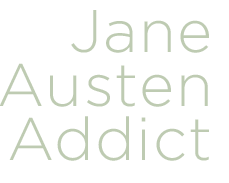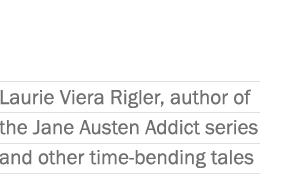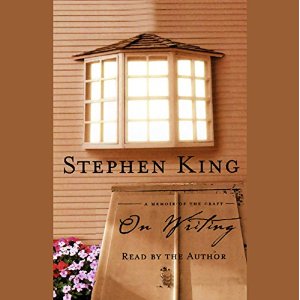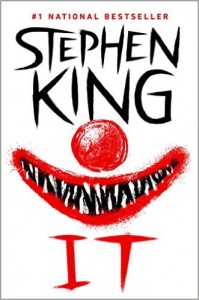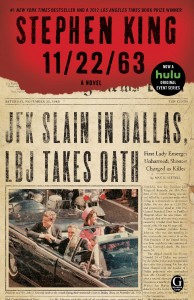I loved every page of this book, which I listened to on audiobook. Stephen King generously (those darn adverbs!) shares his insights about and faith in the magic of storytelling, the nuts and bolts of the writer’s toolbox, his own creative process, and the life events that shaped the writer he is today. He does all of this with the combination of compassion, encouragement, and straight dealing from the b.s.-free zone that I adore about this master wordsmith. A thoroughly enjoyable and illuminating read, with excellent narration by the author himself
Tag Archives: Stephen King
What I’m reading: It by Stephen King
I never did trust clowns. Never did understand how anyone could find them amusing. Or fun. When I see a small child crying at the sight of a clown at a birthday party, I’m like, hey, I feel you. Now, after listening to the mega-long-and-worth-every-second-of-it audiobook for Stephen King’s “It” (over 30 hours!), I feel vindicated. About the clown thing.
I also feel inspired. And awestruck. Because King is truly the master. There is so much depth, insight, compassion, and food for contemplation along with the edge-of-your-seat thrills, that I will be pondering this book for a long time.
I’ve always believed that to write well, one must read. A lot. And reading Stephen King is not only engaging, it comes with a brilliant display of particularity and “show, don’t tell,” and best of of, insightful commentaries on human nature in all its flawed, many-faceted, and endlessly intriguing forms.
“It” deals a lot with childhood. The sheer hellishness of it–bullies, clueless and cruel adults, the phenomenal willpower it takes to withstand parents who are bent on crushing every bit of individuality and light from their children. “It” also sings of the magical power of childhood–the ability to see and sense what adults are blind to, the belief in the existence of magic and all the things, good and evil, that adults simply cannot or refuse to acknowledge. And the life-changing, dragon-slaying power that childhood belief can wield.
Now that I’ve read 11.22.63 and It, I can’t wait to read more. But which one to read next? Thankfully, there is much to choose from; the man is seriously prolific.
I’m thinking maybe Dolores Claiborne, since I saw the movie at least three times and couldn’t stop thinking about it for many reasons, including its echoing of the myth of Persephone, its themes of surviving trauma, and its multi-layered performance by the inimitable Kathy Bates.
What I’m Reading: 11/22/63 by Stephen King
I’ve decided that the definition of “unputdownable” in the OED should now be “11/22/63 by Stephen King.” I have lost sleep and work time racing through yet savoring every word of this masterfully written time-travel, what-if, alternate-reality tale of a man who travels back through a time-warp/rabbit hole in the back of a diner that lands him in 1958, where he must spend the next five years planning how to thwart the assassination of JFK. On the way, there is more of the past to tamper with, survive, and fall in love with–especially because it is where he meets his soulmate. But nothing is ever easy when it comes to changing the past, no sir. The past will do anything it can to stay put. “The obdurate past,” as King puts it. Indeed.
The past is also “harmonic,” according to 11/22/63. In fact, the act of reading 11/22/63 seems to generate its own harmonies, for as I entered the last third of the novel, an ad for the event series based on the work caught my eye on the Hulu home screen. Now I won’t have to feel as sad as I usually would do upon turning the last page of such an enthralling, mind-expanding read. I’ll have eight episodes to look forward to. Am hoping they do this brilliant work justice.
